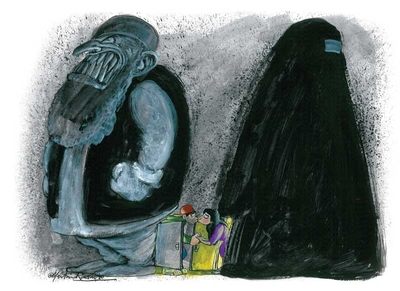 There is an assumption that the experience of migration to, and subsequent life in, Europe does nothing to change Muslims and that, in fact, their religious affiliation is of such overwhelming importance to them that nothing else goes into forming or maintaining their identity. This, I think, is far too crude and pessimistic a view.
There is an assumption that the experience of migration to, and subsequent life in, Europe does nothing to change Muslims and that, in fact, their religious affiliation is of such overwhelming importance to them that nothing else goes into forming or maintaining their identity. This, I think, is far too crude and pessimistic a view.
The largest group of Muslims living in the Netherlands is of Indonesian origin, but of them little is heard because they are law-abiding and religiously undemanding. The Islam of Indonesia is famously – or notoriously, depending on your point of view – mild and unfanatical, or was until recently. The possibility that it might change in the direction of rigour, a change that some claim is already happening, does not alter the logical point, that Islam does not always consume those who profess it to the exclusion of all else.
Surveys in France have found that more than half of French Muslims feel that their primary identity is French rather than Islamic. Most have a good or favourable impression of the country. Perhaps this is not surprising, since attendance at the mosque among them is high only by the standards of church attendance in one of the most irreligious countries in Europe. A fifth of Muslims in France marry out of the religion, and while it is possible that some of them require the conversion of their spouses as a condition of marriage, it is also likely that many of them are expressing an indifference to their religion by their choice of marriage partner.
Of course, the meaning of survey evidence is not always clear. People may lie about their real feelings or beliefs, despite all promises of anonymity. The relation between their answers, even if indicative of their true beliefs and feelings, and their conduct is unknown. After all, we most of us have beliefs and feelings, even strong ones, upon which we do not act, indeed beliefs and feelings against which we act when compelled to do so by other stronger motives. These caveats must be borne in mind, whatever the views expressed in the survey. Be that as it may, most Muslims in France, when asked, say that they wish to be accepted as full members of the nation: and surely they would not say that if they accepted the Islamic demand that their Islamic identity is all that should matter to them? It is implausible to suggest that all who answer in this fashion are indulging in taqqiyah, the religiously permitted form of dissembling, particularly endorsed by Shia Muslims in times and places when they were persecuted, in order to further religious ends.
Westernisation is in fact far advanced among Muslims in Europe, as elsewhere. This is evident from Islamic marriage websites, for example. The men appear in Western dress, as do the great majority of women. What is striking about the websites of British Muslims, in fact, is that all the men look profoundly American, usually in T-shirts and often in baseball caps. Furthermore, the language in which they describe themselves is Mid-Atlantic, not British, English. They are fluent in psychobabble, that peculiar language that allows people to talk about themselves at considerable length without revealing anything, and is a symptom of self-obsession unaccompanied by self-examination. Here is a young man who introduces himself by saying “Salaamz all”, an expression redolent of cultural mixing if not outright confusion, and who is looking for a Muslim woman to marry: “I’m a laid back and relaxed individual. I am quite sarcastic and have a unique sense of humour. I can be childish at times but know when to be serious. I believe we all have our ups n downs but we should try to look for the good in ppl … I like goin on long drives. keepin abreast of world affairs. I enjoy goin out for meals, goin to the cinema, bowling, snooker, cricket.”
Asked to describe the level of their religious belief, all the searchers for brides and grooms say that they are “somewhat” religious, which suggests – at least to me – a level of commitment a good deal short of fanaticism. The young man above says of himself, “I am far from being able to call myself a perfect Muslim, but I can say im [sic, and incidentally typical of the orthography of the cellphone generation] a good human being.” He says that he tries to pray, which means, I suspect, that he rarely succeeds, and that he is “working on becoming a 5-timer” (i.e. someone who prays five times a day).
Now in my experience people who say that they are “working on” something such as a bad habit, a vile temper, eating too much, a sedentary lifestyle, laziness, giving up smoking and so forth, rarely get anywhere because their heart is not in it. I would not, therefore, expect this young man to become a deeply observant Muslim in the near future, and I don’t think he expects to either. He reiterates that he has a lot of room for improvement in his observance, but writes, “I have a good heart and my intentions are clean”, thus accepting the modern view, not by any means unique to Muslims, that, morally speaking, intention trumps both performance and effect. (If he didn’t believe it, and thought others didn’t believe it, he would hardly mention a trait that is clearly intended to be endearing rather than off-putting, a form of boasting dressed up as modesty.)
Perhaps what women write is more surprising, in view of the position of women often observed in Islamic societies. Here is what a woman, dressed in western clothes and with a photograph that shows her without veils or scarf, says (not untypical of the site) of herself: “Hello all im a fun loving woman, im down to earth and do not judge people.”
The idea that an unwillingness to pass judgement on people is a sign of moral election, and therefore a deeply attractive quality, is surely one that is much more compatible with and derived from secularism as it has developed in the Western world in the last two or three decades, than it is compatible with or derives from Islam, especially in its fundamentalist mode. Bear in mind that this woman is hoping to find a husband by her self-description, who she supposes will share her self-congratulatory view (a very shallow one) of the proper role of the judgement of others in human life. In other words, she supposes that this view of the role of judgement – that is to say, none – is one held by many others. And one might remark in passing that a “sense of fun” is hardly one of the most obvious features of Islamic fundamentalists, though no doubt there are certain sour satisfactions to be derived from contemplating the fathomless depravity of all those who do not submit themselves unquestionably to one’s strictures.
The fun-loving woman goes on to say, “I am looking for a partner to settle down with.” What is notable here is that, like any educated or semi-educated middle-class person who wants to demonstrate the modernity of his or her views, and their supposed enlightenment by comparison with the benightedness of the past, she strenuously avoids the use of the word “husband”, with all its supposed connotations of subordination and obedience, preferring the politically correct, and utterly secular, word “partner”. A partner is an equal, a 50 per cent shareholder: a view of marriage that is completely irreligious.
Compared with the people who appear on marriage websites for evangelical Christians, the Muslims on the Islamic marriage websites are much less concerned with their religion; though, of course, all the Christians, like all the Muslims, have a good sense of humour. (Would anyone advertise themselves as humourless? That, indeed, would be funny.) The religiosity of the Christians by comparison with the Muslims is perhaps not surprising; they, after all, have chosen to be religious in the midst of a society that is highly irreligious and tends to be condescending, at least in its intellectual portion, to religion. The Muslims, by contrast, though they are highly secularised de facto, emerge from a society in which to be totally and openly irreligious is almost unthinkable. It is the genius of Islam that it early found a method of binding people to itself once and for all, of never letting them go once they had adhered to it; it is by far the most enduring of politico-religious ideologies that has yet been devised. Even where the penalty for outright apostasy is not death, the social penalties applied to apostates, such as ostracism, are sufficiently strong that only fanatics of abstract truth are willing to suffer them.
The great majority of humanity everywhere is unwilling to risk much for philosophical principles. This means that there will remain outward adherence even by the fun-loving and humorous Muslims, who will never go to the trouble of exposing their scepticism or incipient unbelief. Why bother, when the alternative is an easy life, lived high in the regard of others? Hypocrisy and dissimilation are what keep social systems strong; it is intellectual honesty that destroys them.
Extracted from The New Vichy Syndrome: Why European Intellectuals Surrender to Barbarism, published by Encounter Books

